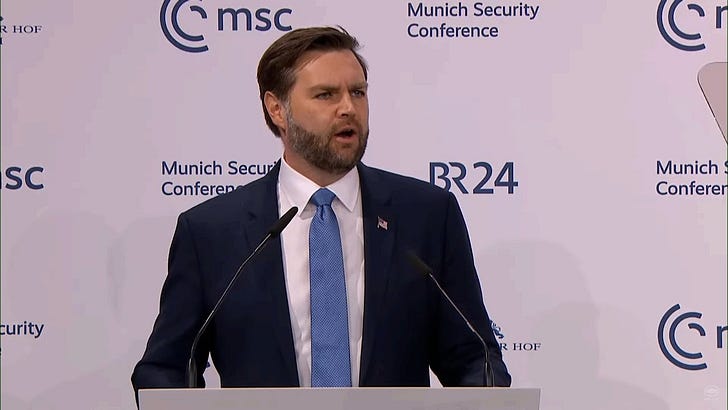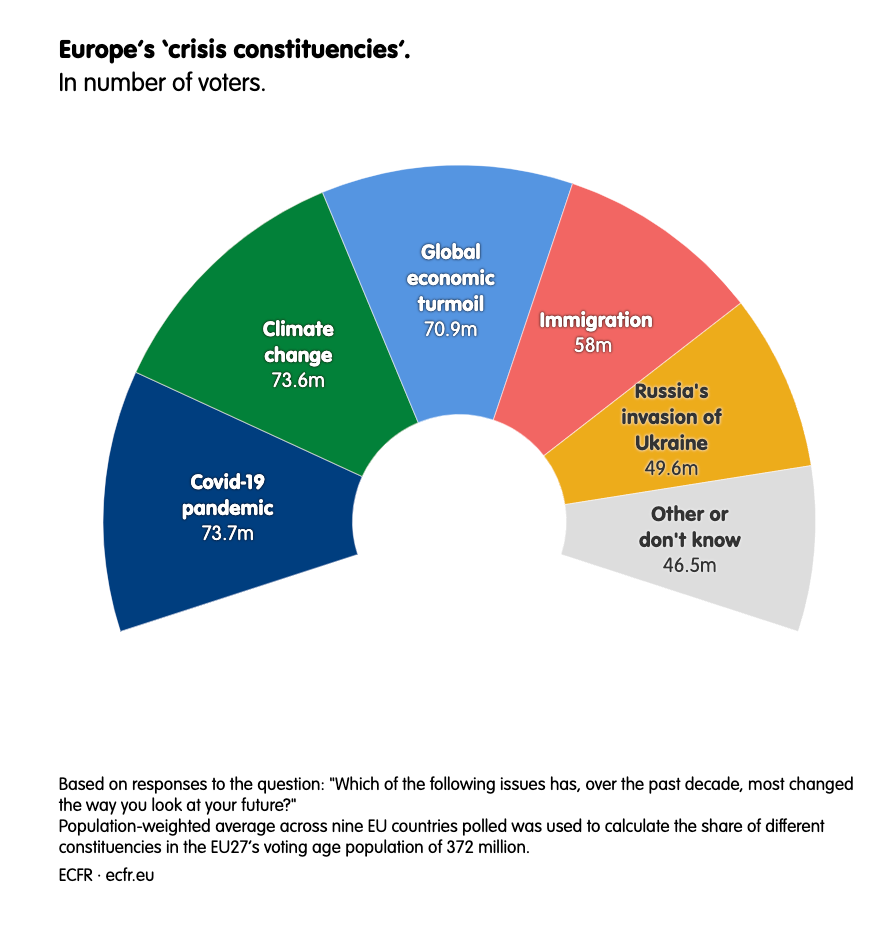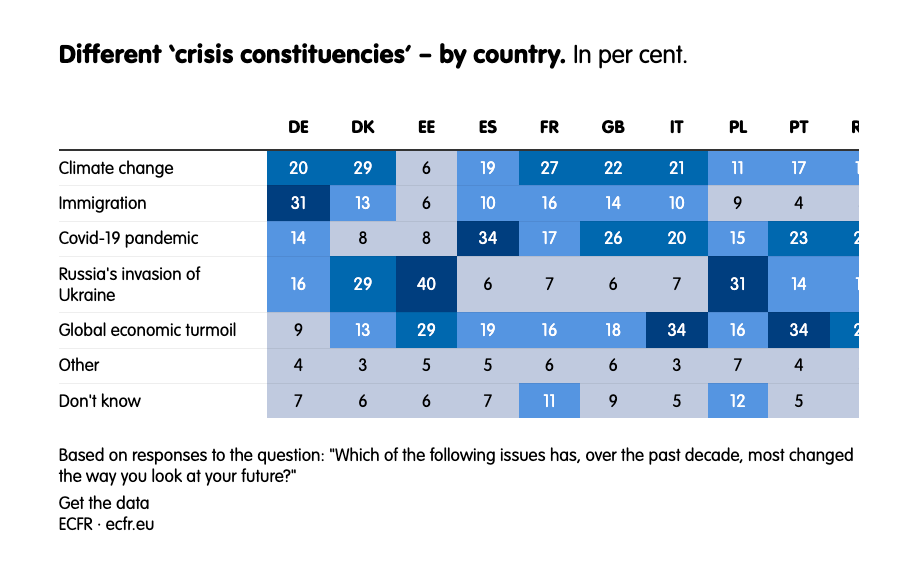MAGA is full of ****. If you don’t know this yet you have not been paying attention. They say and do stupid things that gesture towards a nationalist populist strategy in a flailing way. But most of their utterances are incoherent word salad masquerading as policy. This doesn’t mean that the project 2025 people are not dangerous. They are. So too is Musk. But the political figure heads are playing a different game, mainly about right-wing, nationalist, racist vibes.
Last week, Europe got a dose of MAGA at the Munich Security Conference - the annual gathering of the Atlanticist security policy elite. The fact that Vice-President J.D. Vance’s speech came as a serious shock is a sign of just how willfully blind the European political class has been and particularly that in Germany.
As the FT reported, one European officials at Munich remarked about the US:
“They’re not an adversary, but given what we have heard today we should think of the US as a foreign country.”
… hmmm … yup! … have you actually been to the USA recently?
J.D. Vance is more coherent than his boss and more charming. But in his thinking and speech too, the relationship between any actual problem in the world and the policies that are notionally addressed to that problem, be it tariffs, the value of the dollar, slashing government bureaucracy, mass deportations and tariffs, is oblique. The primary is not actually to fit policy to purpose, but to perform the elementary political function of drawing lines, of provoking antagonism, of finding out who is friend and who is enemy.
Vance isn’t dumb, nor are his speech writers, so they adopted a clever debaters stance towards stirring up the Munich conference. Don’t talk about security. Don’t talk about actual threats. Talk about “what it is” we are defending and hit them with “democracy” the fetish of the Atlanticist alliance, then drive in a MAGA wedge or two, light the fuse, stand back and watch the fireworks. Its an approach any smart law school team with a bit of IR under their belts would adopt. That this was enough to blow up Munich and provoke comparisons with Putin’s far weightier speech in 2007, is a sign of the times.
The fact is that the Trump administration’s understanding of values and politics diverges so far from that of centrist Europeans that Vance’s analogues in Germany - the AfD - are banned from venues like the Munich Security Conference and parliamentary firewalls are erected against them. Vance is a provocateur with nothing but scorn for European political culture. It is not surprising that he took the meeting with Alice Weidel of the AfD, recently endorsed by Elon Musk, rather than a drab and uncomprehending encounter with Olaf Scholz the lame duck German Chancellor who will likely be beaten into a distant third in the election on February 23.
Vance evoked the term “enemy within”. His barbs were against the liberals, but what he was really saying was that in terms of mainstream European opinion, he and the Trump administration are that enemy. And yet, they are, in terms of the US constitution, democratically legitimate. They have a mandate. The first past the post system makes that a clearer mandate than any German politician has enjoyed since Adenauer in his heyday.
Added to which, as everyone at MSC is painfully aware, this “foreign country”, the USA, is Europe’s security provider and despite the warnings signs of the last decade Europe has done precious little to gain independence.
The result is a dilemma, which Vance gleefully exploited.
The European elite represented at the MSC can hold to their firewalls. They can go on excluding the AfD. They can hold to the conception of what Germany calls wehrhafte Demokratie - a democracy unafraid to exclude and repress what the dominant political forces label as democracy’s enemies - but in that case they will have to reckon with their differences with the Trump administration. This will put the Western alliance under huge strain.
If Vance had been willing to respect the boundary between domestic and international politics that conventionally defines international relations, then these tensions might not have been so explosive. Did he have to talk about democracy? About British anti-abortion activists and the Romanian election, about the maneuvers to marginalize the AfD? Such topics, you might say, do not belong in the sphere of international relations and diplomacy.
But Vance’s aim as to provoke and that boundary between domestic and international politics is one that the Europeans and the Americans have been only too happy to blur. No one was keener to do so than the arch-Atlanticists of the Biden administration - remember the Summit of Democracies and its strange guestlist. NATO is the template for this kind of values-based alliance. It has always claimed to be founded on a deeper level of agreement on democratic values. So, questions of democracy and free speech cannot simply be ruled out.
Things would be easier if Vance had shrugged off political differences and focused on “brass tack” issues of military spending. But in one of the subtly striking passages of the Munich speech, he brushed aside matters of defense spending.
Instead he went for the jugular. What Vance effectively announced is that right-wing Americans, which he represents, are not willing to pay for European defense if centrist Europeans censor and exclude nationalist and conservative opinions like his own. He professes to say that right-wing America will contribute to European defense, if European elites adopt his definition of democracy and free speech and abandon their firewalls and open the floodgates to right-populism. But one may doubt whether he is in good faith. The vision with which Vance (and Musk) have terrified European elites, is the possibility of right-wing forces in the US backing a tidal wave of MAGA-style politics sweeping not just particular countries like Italy or Hungary, but across Europe.
The embarrassment of Vance in Munich is that he made clear that if you want to burnish your democratic credentials you may actually have to talk about politics. You may actually have to talk about winners and losers. And you may have to reckon with the fact of who or what won the US election in November 2024.
So this is serious … right?
Of course, it is. The FT concluded its report on Germany and the Vance speech with lines from Robert Habeck:
Robert Habeck, Germany’s Green vice-chancellor, said the speech was a “turning point” in the relationship between Europe and the US. The US government had “rhetorically and politically sided with the autocrats”, he said. Over the course of the weekend in Munich, “the western community of values was terminated here”.
But pull back for a minute from the kerfuffle and remember two points:
#1: The trans-Atlantic gap is not new. Arguably it goes back twenty years to 2003 and Iraq, certainly to Trump 1.0. If you don’t know this, you have not been paying attention.
And #2: One value that MAGA has foresaken is that political talk about serious matters has to make sense.
Remember: MAGA is, above all, full of ****.
What, after all, did Vance actually say?
The one concrete policy proposal that Vance offered was on immigration. He wants tighter restrictions on migration and a comprehensive turn to Islamophobia. He claims that European politicians are not listening to their electorates on this issue. That they are afraid and they are erecting firewalls against democracy.
What world is this that Vance is imagining? The liberal multi-cultural Europe that Vance conjurs up is a straw-man. Across Europe, there is a shameful retreat to xenophobia, racism and exclusion. Far from being silenced, populist pandering is all the rage. As is typical of MAGA Vance is breaking down a wide open door. He makes the point about majorities. And it is obviously crucial. But what do we see? A grubby and rather desperate search for xenophobic majorities along precisely the lines that Vance suggests. And the thing is that it does not really work. Rather than there being a tidal wave of public opinion being held back by obstinate liberal elites, the European electorate is sensibly divided on immigration as a complex and fraught issue.
Source: ECFR
For Vance’s friends on the far-right immigration is the overriding issue. But they are not a majority. In Germany talk of an immigration crisis is particularly vociferous, but, even there, it is the #1 issue for barely a third of the electorate.
This is reflected in polling and elections that, right now, give 21 percent to the odious AfD. Together with the CDU under Friedrich Merz who has recently attempted to tear down the firewall, they would scrape a bare 50 percent majority. In America’s crude first past the post democracy that might give you a mandate. In the Federal Republic’s carefully balanced proportional representation system, it probably would not.
The idea that there is a huge, silent majority demanding draconian action on “the migration crisis” is not a clear political reality, but a figment of MAGA bull****, both in the US and in Europe.
And that was Vance’s one big point.
His other talking points were fatuous. The Romanian election is a mess, but does he seriously expect to hinge US-European relations on that? Like many American right-wingers he wants to curtail reproductive rights. But does he seriously expect abortion politics to become a major issue in Europe, let alone in international relations? The jabs against the UK were soundbites made for domestic consumption, to be recycled on Fox News at the right moment.
The AfD, for which Vance, Musk et al demand more space is thoroughly obnoxious and closely aligned with Trump, but it is hardly a formidable political organization or a tool for wielding state power. What concrete area of policy does Vance believe will be better addressed, if the AfD is given a louder voice in the German Bundestag?
During the heyday of the Cold War, between the 1945 and the 1970s, the great political power blocs of business and organized labour, Social Democracy and Christian Democracy maneuvered trans-Atlantically to shape both West European democracy and the NATO security order. Their shared goal, on both sides of the Atlantic, was to exclude the Communists and to contain the far-right fascist forces too - though to a much lesser degree, especially if they were useful in the anti-Communist struggle. To achieve their strategic goals, they engaged not just in political maneuvering and culture wars, but in sustained strategies of socio-economic change. It was a struggle for hegemony.
This is not our reality today.
On both sides of the Atlantic the shape of class forces and contending democratic movements is far more opaque and obscure. Confronted with the debility of American politics and the tongue-tied paralysis in Germany, a declinist narrative seems inescapable. Adenauer and Eisenhower were of a different caliber. In fact - god help us - Reagan, Bush and Kohl were too. The fact that the “elite” at Munich could be so upset by Vance’s speech is a sign of just how attenuated the political class has become.
In part the lines between friend and foe have become blurred. Radical Islam, Putin’s Russia and CCP-led China have all been mobilized as “the” external threat. None has quite served in the way that the Soviet Union did.
But all of this has been apparent for a decade. And the answer is clear.
If Europe wants to be able to dismiss the sophomoric antics of Vance et al in the way they should, they need to be able to provide for their own security. Europeans will have to pay for and organize their own defense and face the political, diplomatic, financial and social consequences attendant upon that. This will take some extra spending, a lot of industrial policy and above all a serious effort to forge a common European security force and security policy. Whether Washington would actually welcome a truly independent European military capacity, is an open question. Its preferred option would no doubt be large European armies, armed to the teeth with US weapons and firmly under the NATO command structure.
Europe’s failure to face these obvious questions is, indeed, a profound failure of democracy. It is a dispiriting case of “selbstverschuldete Unmündigkeit” (Kant), self-imposed immaturity. The price you pay is that you have to take MAGA’s bull**** and its very real consequences seriously.
***
Thank you for reading Chartbook Newsletter. It is rewarding to write. I love sending it out for free to readers around the world. But it takes a lot of work. What sustains the effort are voluntary subscriptions from paying supporters. If you are enjoying the newsletter and would like to join the group of supporters, click here:






Writing from Marseille, I would suggest that the West European establishment may be more focused on creating a livable society for its citizens than we are. Though the French like to complain that public services are getting worse for them (i.e., privatized), I find the vitality here--buses and metros pumping people across the city, old men playing the French version of Bocce in the parks, mountain trails with plenty of local hikers--very different from the sad vacuum of so many American public spaces. The difference is stark.
Hi Adam—thanks for the piece. I wonder if dismissing MAGA, Trump, and Vance as mere bluster is somewhat wishful thinking. They have a clear vision for the world and are actively working to reshape the status quo. During his European visit, Vance outlined concrete policy positions on AI regulation, security, and free speech—these weren’t just empty rhetoric.
What competing vision does the other side offer? The status quo in Europe is undeniably broken. European nations are aging, becoming poorer, and growing weaker. The economic divergence between the U.S. and Europe has been stark and continues to widen—doubling of the GDP gap being a prime example. Europe remains reliant on the American security guarantee for its defense, how sustainable was that, even without MAGA? You assert that the silent majority don’t want MAGA style politics- how can you be so sure?
Meanwhile, right-wing parties and politicians across Europe have been gaining ground for years (Reform/UKIP, Le Pen, Meloni, AfD) and show no signs of retreating. The decision to exclude the AfD from coalition politics—the so-called “firewall”—seems, in itself, an anti-democratic stance. Is the Pawel-clutching mainstream response to these movements sustainable, or is it merely postponing - and perhaps even making more likely - an inevitable reckoning?